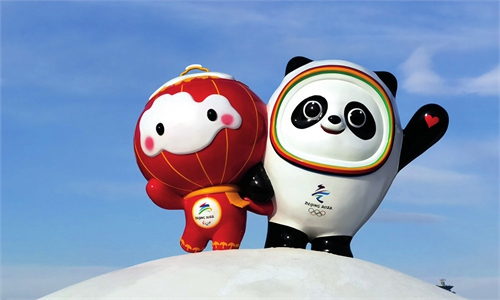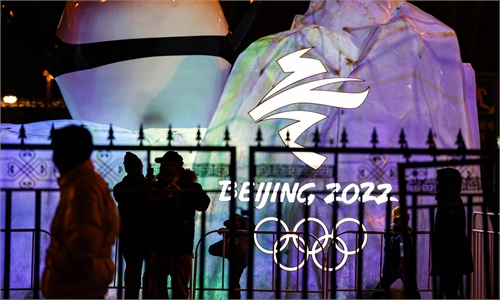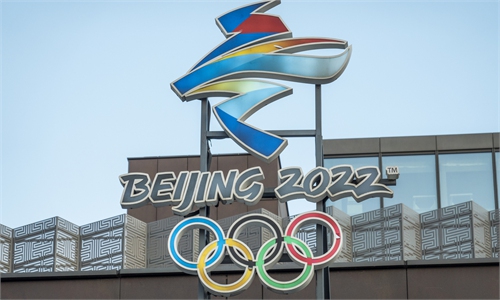
Delegation members of Serbia and volunteers pose for selfies at the Olympic Village for the Beijing 2022 Winter Olympics in Yanqing District of Beijing, capital of China, Jan. 31, 2022. Delegation members and volunteers celebrated the Chinese Lunar New Year, or the Year of Tiger at the Olympic Village on Monday. (Photo by Xiao Shaowen/Xinhua)
The athletes are in place, all the articles and short videos we see on social media say they are happy, comfortable, being well looked after and enjoying China's newest technology with great beds, robotically prepared meals and amazing facilities in a healthy environment, separated from the anxieties of COVID-19.
There have been political boycotts of the Olympics before. Related to apartheid, cold war, human rights or politics but the one most remembered was led, as it is this time, by the US government, which sent no athletes and no officials to attend the 1980 Moscow Olympic Games. The irony of that decision was their reason - the invasion of Afghanistan, something the US troops themselves did some 20 years later and remained in that country for the following 20 years. Four years after 1980 Moscow Olympic Games, citing security concerns, the USSR led a boycott of the Los Angeles Games.
The strangest aspect of this 2022 Winter Olympic "boycott" seems to be that the reasoning this time is based on unproven allegations and a complete disregard of all the evidence to the contrary, as well as a lack of desire to establish the veracity of any, or all of the claims being made.
Even more embarrassing is the fact that after announcing the "diplomatic boycott," the US applied for and were granted 46 visas so they could send "officials," most of whom apparently work for the Department of State - meaning they are, for all intents and purposes, diplomats. The US asked others to boycott but the response was, at best lukewarm. Canada, Australia and the UK, of course, all Five Eye intelligence cooperation nations agreed, New Zealand are reported to have agreed but sent a letter to the Chinese organizers as early as October, two months before any boycott was announced, stating they would not be sending officials due to COVID-19 concerns.
The city of Beijing is unique - geography means it has a very warm summer and a very cold winter. As a result, its the only city in the world to host both a Summer and a Winter Olympic Games. In 2008, a huge 588-person team from the US attended and George W. Bush personally came to China. By all accounts he enjoyed his time, he cycled with athletes and played volleyball on the beach. There were no calls for boycotts, no allegations of human rights abuse and no indications that there was anything other than a strong relationship between the world's leading superpower and the upcoming one.
What brought the change about has been a steady decline in the way the US manages its international affairs.
Shortly after George W. Bush came to China in 2008, Barack Obama was elected and decided to ease back on his country's Middle East policies and "pivot to Asia." Considered by many to be an abject failure, it created tensions, military escalations and these brought about a decline in relations between the obviously growing China and the seemingly declining US. Opportunistically, Donald Trump saw, in China, a wonderful opening, a chance to deflect the blame for many of America's problems.
Joe Biden is now between a rock and a hard place. If he's seen to be conciliatory toward China, he knows he can't get his party supported in the upcoming mid-term elections; if he hardens his line on China, his country would suffer more economic losses. But to China, and in relation to the Winter Olympics, this isn't important.
Chinese people don't feel pressured by the US. Most people seem bemused by the fact the US wants to diplomatically boycott and tried to send 46 officials. The US talk of broad support but only a handful of allied countries support its stance - none of that is important to the people of China. When it comes to the topic of the US, they simply don't care.
In preparation for this article, I asked several Chinese friends and family members what they thought. Overwhelmingly they are looking forward to seeing the opening ceremony. Underwhelmingly, when asked about the US stance, their response was the same: If the US wants to come, China will welcome them; if they don't want to come, why should we care?
The author is a British Australian freelance writer who has studied cross cultural change management in China and has lived in the country, traveling extensively for 17 years. opinion@globaltimes.com.cn



